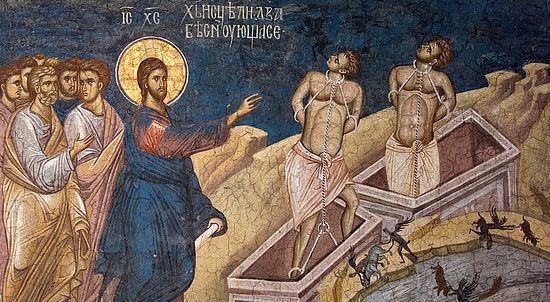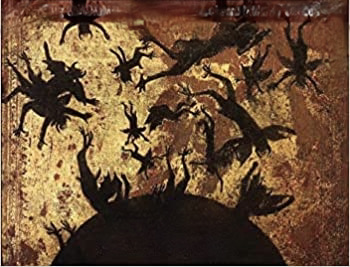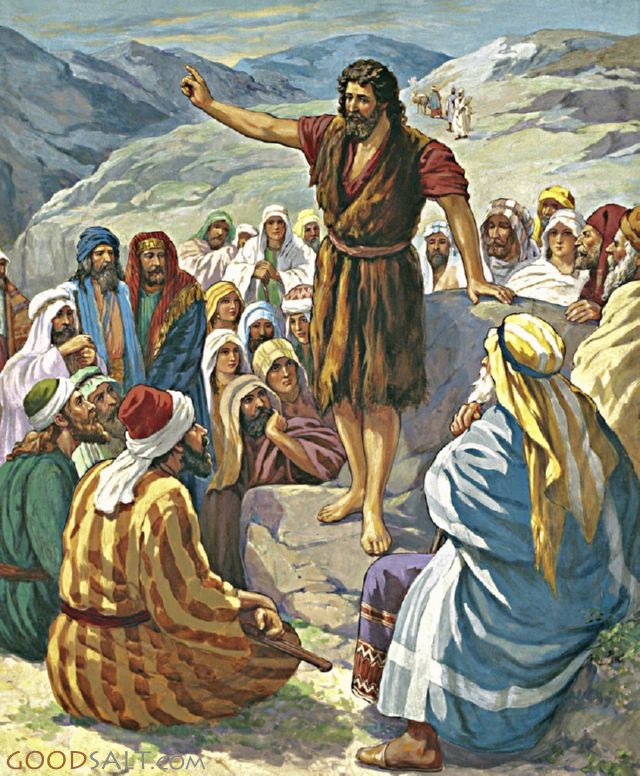
John 21:1-14 (Matins)
Galatians 2:16-20
Luke 8:26-39
Harrowing Gad
|
My name is Legion, for we are many.
(Lu 8:11)
|
In the Name of the Father and of the Son and of the Holy Ghost. Amen.
Throughout the Bible,
we hear of most exotic lands:
the Kingdom of Heaven
(never heard before Jesus spoke it),
the Bosom of Abraham
(never heard of before Jesus revealed it),
the Garden of Eden,
and in today's Gospel lesson,
the Land of Gad.
Yet,
these are not merely physical locales.
You cannot get in your Galilean boat in any state of mind or soul and sail to them.
We cannot imagine scientists scaling a mighty mountain
to "look into this Kingdom of Heaven business."
St.
Luke goes out of his way to emphasize
this in depicting the Land of the Gad.
For the boat carrying Jesus on this expedition must pass through a hair-raising tempest
in order to get there as if passing through a wormhole (we would say today).
Commentators from Antiquity and later have written that the Land of Gad is
an impossible geography.

Truly,
these places are not geographies .... at least not ones that we might sail to.
They have more to do with our state of being
than with our GPS position.
Consider the two most important messages of the Holy Scriptures,
proceeding from the God-man, Jesus,
and
from the Forerunner, John the Baptist.
As Jesus enunciates the very first words of His three-year ministry,
He declares,
Και
λεγων
`οτι
Πεπληρωται
`ο
καιρος.
Και
ηγγικεν
´η
Βασιλ´εια
του
Θεου:
Μετανοειτε!
Και πιστευετεα εν τω ευαγγελιω.
"The time is fulfilled,
and the Kingdom of God is at hand.
Repent, and believe in the gospel."
(Mk 1:15)
|
The words of John the Baptist are nearly identical:
Μετανοειτε!
ηγγικεν
γαρ
`η
Βασιλ´εια
των
ο´υρανων.
"Repent, for the Kingdom of Heaven is at hand!"
(Mt 3:2)
|
In both cases,
the message is twofold:
(1) "Turn back!"
and
(2) "The Kingdom of Heaven has drawn near!"
Let us avoid the translation, "repent."
Unfortunately, in our own time this word summons up a
New Yorker magazine
cartoon featuring
a man with a long white beard in a white gown standing on a street corner with a big sign.
The Greek word is
Metanoiete!
It means, "Make a U-turn!"
It is a word signifying inner transformation.
Here, too, we must be cautious,
for in our "progress"-dominated minds,
we see transformation always in terms of evolution,
implying forward movement.
But this is not the
message declared by the Forerunner
or
by the Son of God.
In fact, their message is the precise opposite.
They exhort us
to turn back,
returning to an earlier and better life.
The destination they have in mind, of course,
is Eden.
St. John the Baptist is
the man of Eden,
eating only a manna of honey-bread,
ενκρις / enkris (Mk 1:6),
dressed only in natural clothes,
and
fragrant of the morning of the earth.
His purity attracted everyone
(the Gospels report)
to his ministry of purity, of cleansing.
Jesus of Nazareth was (and is) the embodiment of Eden.
For He uniquely is both a perfectly complete noetic being
and
a perfectly complete material being.
Or, better said,
Eden is the most perfect, most fulfilled representation of life in all the Creation,
for it alone manifests its Creator.
It too is fully noetic and fully material.
This was the glory of Adam and Eve.
Like their Creator,
they alone were fully Divine and fully human
—
in perfect balance and in flawless expression.
When Jesus uses the phrase,
"the time is fulfilled,"
this kairos signifies the same ideal:
fullness,
a superabundance of life,
being both Divine and human,
for
(as He says)
the Kingdom of God has drawn near.
We might picture the air so full of the vapor of God's Breath,
that it is about to rain Divine Fire.
The air is heavy with God
—
an image borrowed from Luke's description of Pentecost (Acts 2:3):
surrounded by "tongues of fire."
"It is right before you!"
Jesus says.
"Do not miss it!
Your eyes and thoughts are so fastened upon the world, the flesh, and the devil,
that you are missing it!
Turn back!
Make a U-turn!"
Given the "pop Christian" vocabulary dominating our culture,
we might expect the word salvation to crop up in this context.
Now,
here is something that will surprise you:
the word salvation appears hardly at all in the Gospels:
not once in the Gospel of Mark or the Gospel of Matthew,
only once in the Gospel of John,
and
then only six times
in the Gospel of Luke.
In any case,
this word is not what most people think it is.
It does not equate to Heaven.
Think, for example of the trademark Evangelical Christian's question:
"Are you saved?
Do you have salvation?"
What it means
—
the Greek term is
σωτεta;ρι´α
(soteria)
—
is the absence
of enemies or adversaries standing in your way.
Think of a road to Eden,
a road to Heaven,
that is cluttered.
Salvation means to brush aside these obstacles,
so that you can begin the journey.
It an "accessory" word:
"the absence of impediments to Eden."
The primary word is Eden.
Well might we call to mind these basics.
For this is the sum and total of our faith:
a constant, godly motion toward Eden (we pray).
We call this to mind
especially
as
a spiritual map (or nautical chart) set before us
as
the Son of God sails on to the Lost Tribe of Gad,
as only He can.
Let us remember that
He
has been sent by the Father to gather the Lost Sheep of Israel.
As He calls the Twelve Disciples,
He discloses this the purpose of their joint ministry.
You might think of this as a glimpse into their Apostolic orientation session:
These twelve Jesus sent out and commanded them, saying: "Do not go into the way of the Gentiles,
and do not enter a city of the Samaritans. But go rather to the lost sheep of the house of Israel.
And as you go, preach, saying, 'The Kingdom of Heaven is at hand.' Heal the sick, cleanse the lepers,
raise the dead, cast out demons.
(Mt 10:5-8)
|
And we must remember that the Land of Promise and this chosen people
were set apart
for the purpose of recovering Eden
—
to undertake yet again God's ideal for human life.
Where God is connected to humans,
the subject is always the same one:
the return to Eden.
In this sense there is no distinction
between
the phrase the Kingdom of God
and
Paradise,
or
Eden.
Otherwise, how can we say,
"I believe in the Resurrection of the Body and the Life of the world to come"?
You see,
Heaven is not an aggregation of spirits,
but
rather the perfection of life seen in our Creator.
As we were discussing earlier,
where is any geography that is purely spiritual?
It is not Heaven
because the Son of God and the Creator of the Universe is fully man.
It is not Hell,
for, yes, the demons are spiritual beings,
but I understand that they have a lot company just now.
Perfect of life is seen in our Creator.
You ask,
what is excellence,
what is perfection,
what is the highest of highest?
The answer is always the same:
Jesus Christ,
the God-man,
the Only-begotten Son of God,
Who insists on the high dignity of the body.
Indeed,
as the Risen Christ is fully human,
our human nature, most fully expressed in a Person of God,
participates in the Holy Trinity Itself.
Yes, the Holy Trinity is composed,
in Jesus' Person,
by human nature.
The Lost Tribes are all around Jesus.
As He journeys through Galilee and Samaria,
He crosses the lost boundaries of
Asher, Naphtali, Zebulon, Issachar, Manasseh, and Ephraim.
The Four Gospels, however, present only one explicit journey to a tribal land,
the Land of Gad.
Yet,
like the Kingdom of Heaven or the Garden of Eden,
Gad is both a physical location and a spiritual landscape.
It has a history, though not an
auspicious one.
For Jacob's son Gad was the issue,
not of Leah or Rachel,
to whom he was married,
but rather of Zilpah,
the slave of Leah,
who was given Him for sexual pleasure.
In this sense,
Gad is analogous to Ishmael,
the issue of Hagar, Sarah's maidservant.
As Jesus arrives
to Gad's historic homeland,
we soon realize that the vocation of this ancient Tribe of Israel
as veered
from God's ideal.
Scholars write about the
Vestiges of Paradise tradition
going back to the Middle Ages, perhaps to late Antiquity,
as a way to talk about the surviving artifacts of Eden.
You will see Eden's vestiges here and there.
If we should see a man living his life unclothed,
trying to get back to the wilderness,
do we not see a refugee from Eden?
Who in the Bible lives a daily life unclothed?
And the wilderness is always the place of purgation and purification.
Who, then, is the "number one" target in Gad for the demons then?
Why, this obstreperous man who doesn't know how to keep his mouth shut!
Sisters,
the number one target for the demons are yourselves
because you are holy.
They ignore those whom they already have "in the bag" ..... to borrow
a Haitian expression:
the big bag of Tonton Macoute.
And Gad, therefore, turns out to be
to be the antipodes from Eden,
to furthest extreme from God's ideal for human life.
We do not err to call Gad the anti-Eden.
As Jesus arrives, He beholds the culture of death incarnate:
men living in tombs bound in chains,
presumably enslaved to gross sins.
They are literally bound to the earthly life.
Their diet is the filthy and forbidden flesh of swine.
Demons overrun the place, for they manifest themselves
not in ones and twos but in legions.
When they meet the Lord of Life, they plead with Him to depart.

Wait,
do we not know this voice?!
Have we not met heard this before in the Gospels?
|
an unclean spirit .... cried out, saying, "Let us alone! What have we to do with You
Jesus of Nazareth? Did You come to destroy us? I know who You are — the Holy One of God!"
(Mk 1:24)
|
And
in St. Matthew's version of
Jesus' visit to Gad:
|
two demon-possessed men, coming out of the tombs, exceedingly fierce, .... cried out, saying,
"What have we to do with You, Jesus, You Son of God? Have You come here to torment us before the time?"
(Mt 16:18)
|
From our Gospel lesson at St. Matthew has recorded it.
And is this not the attitude of all Gadarenes
as the demons of God run rampant in a field of victory?
"Go away!
We don't want you here!"
Now what on earth could impel one to send away a healer or a life-giver ....
except it be the disease itself?
Only disease fears healing.
None other than death, the trajectory and blueprint of disease,
sends away the Giver of Life.
Yes, this most certainly is the anti-Eden.
Rather than being a place of Eternal Life, it is the place and culture of death.
Rather than being a place of ultimate freedom,
it is the place of enslavement and chains.
Rather than cultivating fragrant groves offering up fruit of the vine,
it is the place of filthy and forbidden food.
Rather than being a place abounding with Eden's flora and fauna,
Gad is the place of death,
of tombs
and
of wailing madness .... and we might say,
the gnashing of teeth.
Gad is the outer darkness (Mt 8:12).
☦
What does all this mean for us?
The Kingdom of God has come near.
It is fully present all around us
as
the Holy Fire of God's breath stirs in every living thing.
We need only reject what is unworthy
in our lives
in order to step through this thinnest of veils between ourselves and Eden.
It is within our reach!
We need only reclaim the lightness of being,
a balance between the noetic and the material,
of the cleansed soul and purified will,
held in balance
with
a blameless body ....
finally, perfect freedom and peace.
This is life.
This is Eden.
The furthest point and opposite end of this life we discover as Jesus lands
upon the shores of Gad.
A land founded to recover Eden has become a lost world:
perdition.
Like Eve and then Adam,
who chose separation from God (which is always the anti-Life),
the Gadarenes
have arrived to the furthest extreme from Eden,
which was always so close,
around them
and
within them.
For all ungodly choices must by that fact be anti-Eden.
The soul can never be void.
Either it is filled with Divine life and purpose, Which we call the Holy Spirit,
or
it is filled with demons,
with whom the Holy Spirit can never co-habit.
Does Jesus not constantly tell us,
you are either "in" or "out";
you are either "hot" or "cold"?
There is no middle ground.

Jesus, His Forerunner John the Baptist, and then later the Disciples and Apostles exhort
the Lost Sheep of Israel to return to Eden.
Their message rings out down the ages to our own lifeworld:
|
Metanoiete!
Turn back, for the Kingdom of God has drawn near!
|
St. John the Baptist appears as
the man of Eden
in his manner,
language,
dress,
and
daily manna-bread
in order to
bids all people throughout Judea and beyond to return to Eden.
His life as a Nazirite bespoke purity.
He eschews everything that stinks of the cities of Cain
and
the sumptuous halls of luxury.
His very appearance calls out to them:
"Come with me to Eden!
Let us depart from the city fleshpots!"
His ministry of baptism, of course, centers upon purification,
recovering the original and pristine in our lives.
We have recounted here many times
how hard the Apostles had to labor
to point the people to Jesus and away from the man of Eden,
so prepossessed were the people by
this idea,
which always rings true,
of returning to our original innocence.
We continue to encounter people
in the Acts of the Apostles
(think of Apollos from Alexandria)
who were "baptized with the baptism of John"
The Lord of Life bids us reclaim our original, innocent nature.
For He knows
(He made us)
that all humans are born with this nature,
with this birthright to Eden.
He teaches,
|
"Let the little children come to Me, and do not forbid them; for of such is the Kingdom of God."
(Mk 10:14)
|
Every person born into the world
(so the Orthodox Church teaches)
is possessed of this innocent nature.
Each of us begins in Eden.
Some of us
(though sadly few)
have remained in that innocence all of their lives.
These are not the ones for whom the Forerunner and the Son of God were sent into the world.
Tragically,
our world is a broken one
as so many have consented to the life of Gad.
They live in chains .... with their drugs, pornography, alcohol, and out-of-bounds desires.
Their element has become the forbidden and the filthy.
They are the Lost Sheep whom Jesus and His Disciples seek.
Do we not see in Gad an image
of our own lost land?
In 2017, roughly 20 million Americans battled an addiction to drugs or alcohol.
40 million Americans today regularly use pornography.
Every year 20 million Americans present with new STDs (according to the CDC).
And who can doubt
that Christians are marginalized, even hated, because they love the Lord of Life?
"Get in to your boat and depart!"
our culture tells us.
For the the disease hates the Healer.
And death cringes in terror before the Lord of Life.
The Lord presents Himself today.
(He will appear before us shortly.)
For He has promised He will be with us
till the end of the age.
He brings healing and acceptance and love.
Yes,
many
will order Him back to His boat.
Yet,
He depends upon us to be safe places for His light and His love.
We must be unfailing presences of His Word and His Ways and His Truth.
Remember the innocence within you,
and
go on loving and trusting and hoping,
for this is the heart of a child.
And,
Jesus assures us,
this is the stuff
of the Kingdom of Heaven.
In the Name of the Father and the Son and the Holy Spirit.
Amen.



